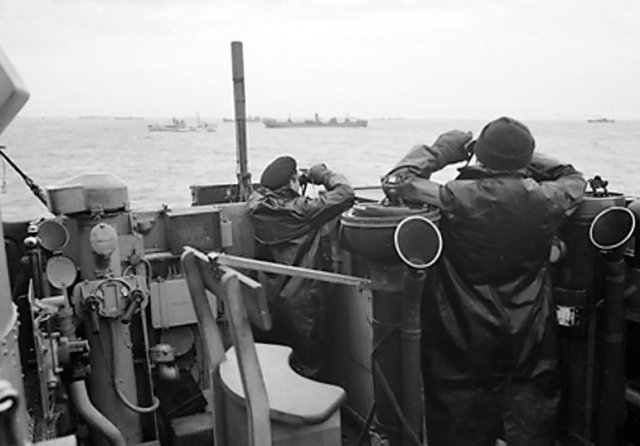The Forgotten Convoy JW53

The third lecture in the Glasgow & West of Scotland Branch David Craig on "The Forgotten Convoy JW53"
The Secretary welcomed Mr. Alexey Kulakov, Senior Consul at the Russian Federation Consulate in Edinburgh to hear David Craig.
This account has been constructed to read like a ship's log, to catch the style and immediacy of David Craig's talk about sailing in 1943 as a merchant navy radio operator to Murmansk. "Went on board ‘Dover Hill' - ex-Clan Line, lovely ship, rather an old wreck. But as the merchant navy was losing ships quickly, we had to go.
Loch Ewe 25th January - convoy collected, waited in half a gale. Escort - three cruisers, including HMS Belfast, a carrier for air cover, sixteen destroyers, four corvettes and two trawlers. We were shadowed by HMS Hood with another battleship and six destroyers; these were to draw the Germans out of Norway.
Gale developed into a hurricane. HMS Dasher an American welded escort carrier split in rough weather. Deck cargo of oil drums broke adrift. Glad to let them go; with TNT in the hold, a hit in the dark would have lit us up. Successive huge waves over the bow smashed lorries on deck. Strict radio silence made it hard to signal to corvette; as we went up, they went down in a trough.
On eighteenth birthday, told gun layer about a sea mine along side; it drifted off. Lost air cover off Spitzbergen. Spotter plane came over. Big air attack - three formations of seven Junkers, one for each of the ships -except for us as the twenty second! When the bombs come down, it makes you think. Our guns opened up, fear vanished - what the old cavalry charge is about!
Port Oerlikon jammed; gunner with cut face said ‘I'm going back to fire.' He lost blood. No docters or nurses. We stitched each other up - with a tot of rum.
Arrived Kola sea loch 27th February. Royal Navy escort had to leave; we waited for the Murmansk pilot. Ship sunk alongside the quay. TNT unloaded on the wooden quay was bombed with incendiaries by German planes; their lines were ten miles from Murmansk. Shovelled snow on TNT. During a later raid, I thought we had not been hit, until a hole in the deck was pointed out next to where I had been standing. There was a bomb in our coal hold.
The captain called for volunteers to help a Russian Bomb Disposal Officer. Out of thirty crew, nineteen stepped forward. The man next to me had a wife and two children, so I thought I'd better help too. Three of us shovelled coal away. The ‘Russkie' used a punch and hammer. We might as well be down here - I thought - as we'll all go up. He tapped, then unscrewed the fuse.
Stranded without an escort and near starvation, we swapped food with Americans in a similar situation. We ‘Limeys' gave them lime juice to relieve scurvy; they gave us spam; otherwise we got a meagre ration of black bread from the Russians, worse off than us. After three months, we left via Archangel for England. Five British Empire medals and fourteen King's commendations were awarded for brave conduct. The captain said, 'We all should have got the same.' "
Four out of the five questions are given below:
1. Why sail in convoy? To keep submarines out.
2. Did ice affect the ship? Yes - on the rigging. We sailed through pack ice on home voyage.
3. Did the Russians and the seamen cooperate in other ways? Informally - swapping tea, ciggies.
4 Why was the convoy forgotten? The naval escort had to leave to fight the Battle of the Atlantic.
The vote of thanks was given by Mr. Alexey Kulakov; "The Murmansk Convoys are a very important part of the history of World War 11 and a very important part of Soviet British cooperation support during the first two years of war. In this connection, it must be noted, that the city of Leningrad, under siege for three years, was supplied only by air and sea. Russia has recognisesd the sailors'service in convoys with anniversary medals. Furthermore, the importance of the role of the convoys is recognised in the Russian school curriculum."
Attendance: 50.
Bibliography "Arctic Convoys 1941-45" Richard Woodman ISBN 0-7195-5079-3.

